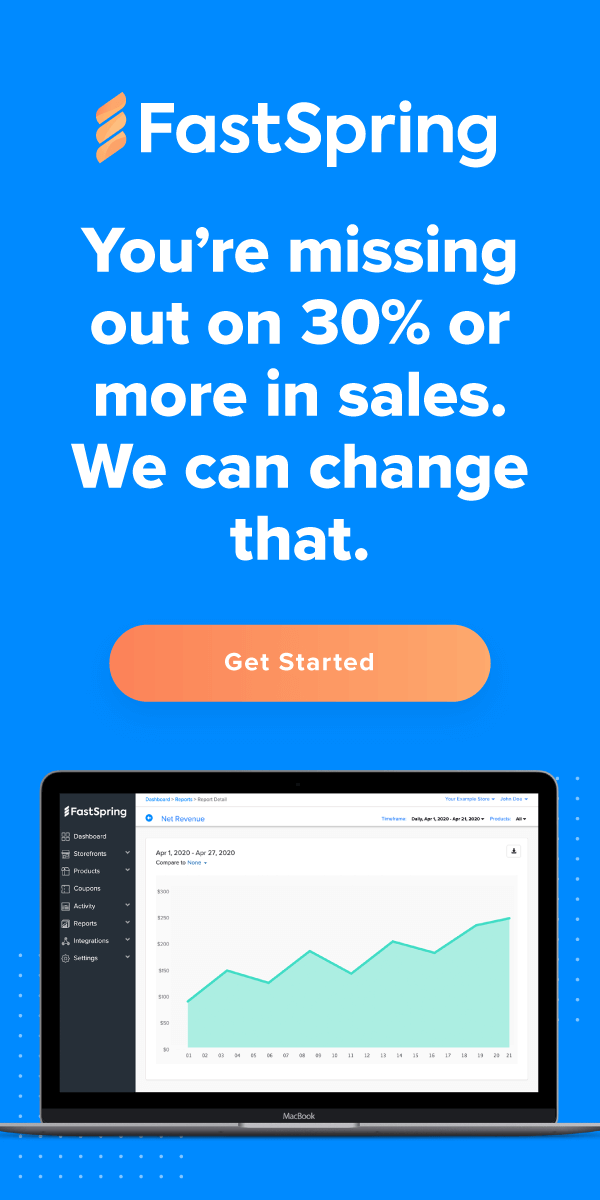(Thanks to Tony Markov for contributing to this article!)
If you’re not sure how to sell an app direct to consumer (D2C) outside the app stores — or if you’re looking for a new way to monetize your mobile app or game — you may be wondering what options you have.
Steep fees from platforms like the Apple App Store and Google Play can understandably cause game developers and app creators to look beyond the convenience and ubiquity of traditional app marketplaces, but restrictions from the platform providers have made it difficult.
However, because of ongoing court cases and the development of new laws and regulations, the mobile landscape is changing.
You may have more options than you thought — but where do you start?
In this article, we’ll cover:
- Current app store practices and rates.
- Various tools you can use to monetize apps and games outside app stores.
- Highlights from recent U.S. and European legal news stories that can affect app sales and game monetization.
If you’re looking for help selling your mobile video game or app direct to consumers, we can help. FastSpring powers global D2C payments for game studios and app publishers. As a merchant of record, we provide a fully managed payment solution including customizable checkout, fraud mitigation, and 100% automated sales tax and VAT compliance. Interested? Set up a demo or try it out for yourself.
How Mobile App Stores Work Currently
Making up 99% of mobile OS market share globally, Android with the Google Play Store and iOS with the Apple App Store have enjoyed a duopoly over mobile software distribution and mobile app ecommerce worldwide. While those markets are beginning to open up, it’s helpful to understand the model that app stores have traditionally worked under.
On the plus side, because major app stores are used by basically every human on earth with a mobile phone, the ability to attract new users for your app or players for your game is unmatched. Then, app stores make it easy and convenient for users to download and pay for new apps and in-app purchases through a marketplace they already trust, and with payment methods they’ve already saved to their account.
App stores also make it easy for app developers to distribute their apps. They also manage important transaction factors such as varied payment methods and currencies, fraud, tech support related to the transaction, and collecting and paying sales taxes.
But that ease of use can come at a steep price for developers.
The Downsides of Monetizing via Major App Stores
Assuming your game or app is accepted by the mobile app store gatekeepers in the first place, the complete lack of competition ensures that the fees associated with sales via iOS and Google Play app stores are very high — usually around 30%.
Those fees also apply to in-game purchases as well. This means that even if you intend to release a free app but monetize it using in-app purchases, your players and users will still be burdened by paying steep fees to the app stores.
Passing the Fees — Or the Savings — to Consumers
Some apps are starting to make it clear that at least a portion of high app store fees are being passed along directly to buyers, but that there are lower-cost options instead.
Otter’s 2023 Pro Pricing Changes
Otter revamped its pricing options in mid-2023, with package pricing changes going into effect in August 2023.
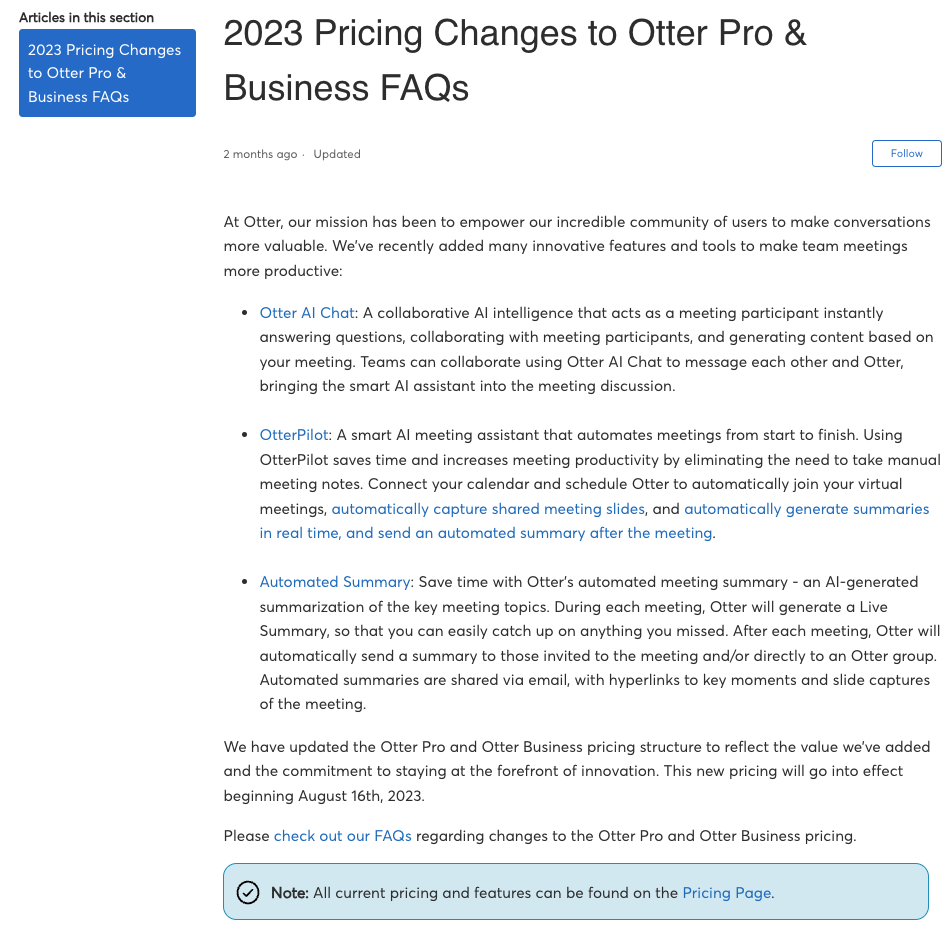
But there was one particularly notable Pro option: Paying for a yearly subscription via Apple App Store or Google Play Store will cost users an extra $10, increasing the price by about 8% from $119.99 to $129.99 USD.
To explain how users can avoid this upcharge, Otter placed a green “Tip” box just below the Otter Pro pricing grid, letting users know they can “Learn how to move your Apple App Store or Google Play Store subscription to Otter via Web.”
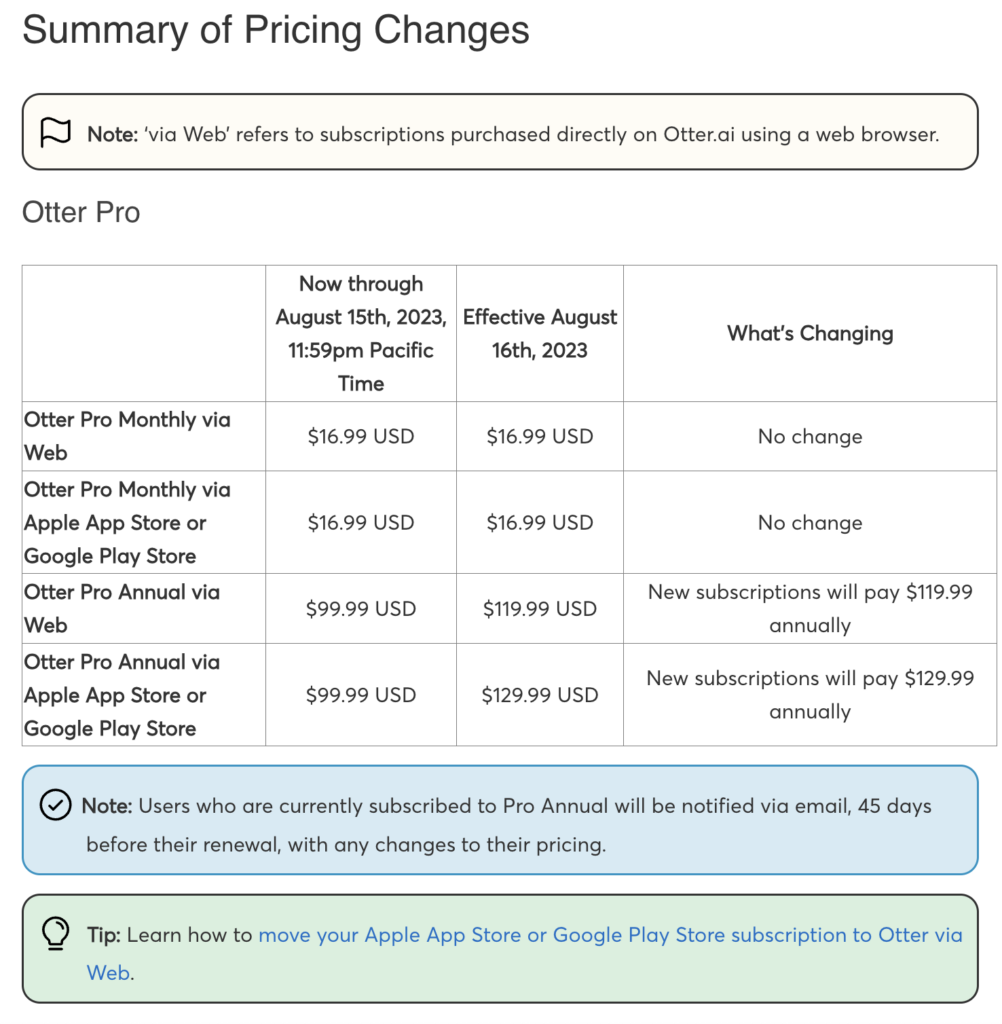
To address this pricing discrepancy more directly, the FAQ section at the bottom of the announcement page states the higher price via app stores “reflects the additional charges required to host the Otter.ai subscriptions on both Apple and Google’s app stores.”
It goes on to explicitly recommend users cancel their current Apple App Store or Google Play Store subscription and just re-subscribe via Otter’s website.
The Growing Trend of Video Game User Account Purchases
Like Otter, many game app developers are offering discounted prices to users if they purchase outside of the app via an external user account that’s linked back to the app.
Developers can advertise these kinds of discounts and user accounts on their websites.
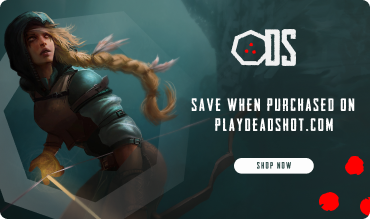
App devs make it easy for a user to sign up by simply opening the app on their phone, tapping a button to create a user account, and completing registration.
Then users can easily make purchases from the developer’s website directly, for much less than they would pay if they made the same purchases within the app. (More on user accounts below.)

The List of App Developers Selling D2C Will Grow
While there are many benefits to selling games and apps through the iOS App Store and Google Play, the downsides on pricing and the limitations on game distribution mean that as court cases continue and new regulations open up the markets, more and more developers will be wondering how they can implement a D2C strategy for their app or game.
How to Sell Apps Outside App Stores
Even though Otter’s app is downloaded via the Apple App Store or the Google Play Store — and Otter is charging a higher price if users pay for their yearly Pro subscription via those stores — there’s still a lower-cost option for their users: Downloading the app from one of the stores, but paying for their service on Otter’s own website using a different payment services provider.
This model is an example of the difference between distributing an app through the app marketplaces, and monetizing an app through the app marketplaces.
Even if downloads of your app are captive to proprietary stores, that doesn’t mean it’s the only way users can pay for your service or features.
Here are some of the key things to consider when setting up your own monetization option outside of major app marketplaces.
Pick a Payment Provider
There are many options for payment services providers (PSP) and merchants of record (MoR) on the market that you can set up to take payments outside of device-captive app stores.
But there is a key difference between payment services providers and merchants of record.
A PSP helps businesses sell a product by handling the specialized services and connections needed to do so (such as connecting payment gateways, payment processors, and a merchant account).
An MoR like FastSpring does all that and takes on important responsibilities such as worrying about card brand rules, regulatory rules in many geographies, risk, sales taxes and VAT, and more. That includes calculating, collecting, and remitting taxes.
If you’re looking for help selling your mobile video game or app directly to consumers, we can help. FastSpring powers global D2C payments for game studios and app publishers. As a merchant of record, we provide a fully managed payment solution — including customizable checkout, fraud mitigation, and 100% automated sales tax and VAT compliance. Interested? Set up a demo or try it out for yourself.
Why Not Just Pick an Even Lower Cost Solution Like Stripe?
Before you jump to considering an even simpler and lower-cost PSP such as Stripe, note that it’s very simple — Stripe is not a merchant of record. Because they do not assume the same responsibilities an MoR like FastSpring does, you will still be responsible for important business facets such as managing risk, dealing with chargebacks, and handling taxes.
Stripe has multiple upgrades available to fill some of those gaps, but each upgrade package will continue to increase the price anyway.
It can be very easy for SaaS companies to outgrow Stripe, so it may be easier to start with a more robust merchant of record from the outset.
User Accounts
To connect purchases between your own checkout option and your app that was downloaded from an app marketplace, you’ll likely need some kind of user account system for users to keep track of — and get in-app credit for — their purchases.
User accounts will allow users to make purchases outside of the App Store or Play Store, then sign in to your app to see the purchase credited there.
In the case of FastSpring, we also provide consumer support to users — so if they have any issues with their purchase or their purchase account, we’ll be there to help.
Purchases tied to users accounts are often in the form of in-app currency or subscriptions.
In-App or In-Game Currency
To monetize your app using in-app or in-game currency, the currency is purchased using real money on your site and then redeemed in your app for in-app items, features, etc.
In the case of many app games, the apps use an in-game currency such as coins, gems, gold, or a unique fictional currency that users can redeem for bonuses within the game. The currency can usually be purchased in various packages, with web-exclusive pricing offered if users leave the app and buy straight from the game developer’s site.
Users can then check out with a typical online purchase experience, such as with FastSpring’s online checkout.
If you’re looking for help selling your mobile video game or app directly to consumers, we can help. FastSpring powers global D2C payments for game studios and app publishers. As a merchant of record, we provide a fully managed payment solution — including customizable checkout, fraud mitigation, and 100% automated sales tax and VAT compliance. Interested? Set up a demo or try it out for yourself.
Subscriptions
Rather than individual purchases as needed, you may prefer to offer access to your app (or its premium services and features) via a subscription, often available monthly or yearly.
Besides a freemium option, Otter’s packages are available as monthly or yearly subscriptions.
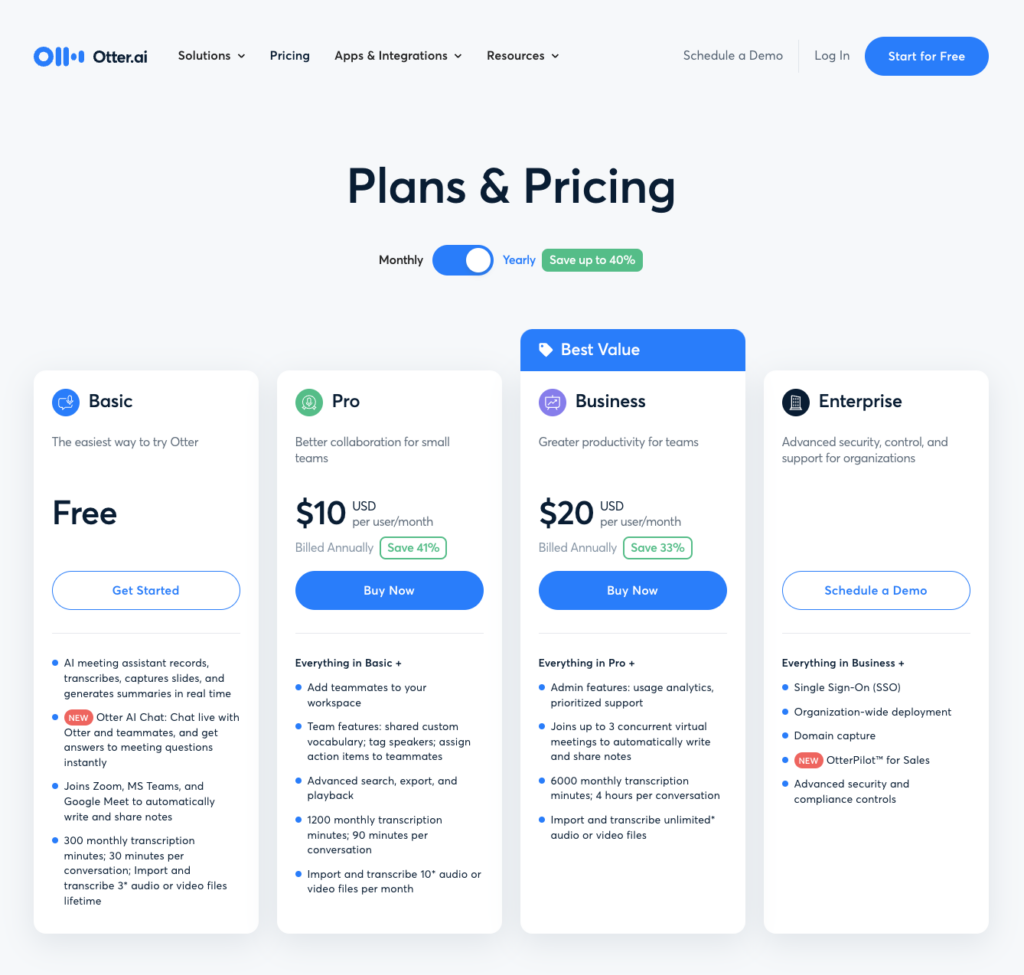
FastSpring provides a wide variety of subscription management tools to help you monetize your app, game, or software as a service.
Items and Upgrades
Items and upgrades are yet another packaging option for monetizing your app. These can be independent of other options like subscriptions and in-app currency, or they can work in tandem with them.
In the case of Otter, which offers a freemium version of their service (either via web or using their app), upgrades such as more transcription minutes, team collaboration, and advanced export options help incentivize users to subscribe to their Pro and Business packages.
In the case of gaming apps, the possibilities are nearly endless — with exclusive items, characters, power-ups, and more to motivate players to shop via the website and redeem in the app.

Legal News Re: App Sales and Monetization
If you’re not familiar with the recent and ongoing legal challenges that could affect both Google and Apple’s stores in some way, there have been quite a few in the U.S. and Europe alone.
The Digital Marketing Act (DMA)
In Europe, the EU’s Digital Marketing Act (DMA) is a law taking aim at what the Commission called “gatekeepers,” and Apple may already be making changes to its policies because of it.
Get the basics and more helpful links here.
Epic Games’ Lawsuits
After Epic Games used discounts to encourage its Fortnight users to use a different payment system instead of the app marketplaces, both Apple and Google subsequently removed Fortnight from their stores in 2020. Epic Games then separately sued both Apple and Google.
In the Apple case, judgments and appeals have been split between Epic and Apple. Of note, the 9th Circuit U.S. Court of Appeals ruled in April 2023 that Apple’s prohibition against allowing app devs from sending users to other non-App Store payment methods violated California’s Unfair Competition Law. Appeals were made to the Supreme Court, but in January 2024, the Supreme court decided not to hear those appeals; read more about responses from Epic and Apple here.
In the Google case, appeals also continue, but a December 2023 ruling found in favor of Epic on all counts.
Disclosure: FastSpring provided key evidence about alternative payment options in EPIC’s antitrust lawsuit against Google. Read more here.
State-Led Cases
In Utah v. Google, 37 attorneys general maintain that Google uses illegal, anticompetitive, and/or unfair business practices that restrict competition, drive up prices, and limit choices, all of which harm consumers that purchase games and other digital goods through the Google Play store. Read more here.
Partner With FastSpring
If you’re looking for help selling your mobile video game or app directly to consumers, we can help. FastSpring powers global D2C payments for game studios and app publishers. As a merchant of record, we provide a fully managed payment solution — including customizable checkout, fraud mitigation, and 100% automated sales tax and VAT compliance. Interested? Set up a demo or try it out for yourself.
![[Customer Story] Why TestDome Considers FastSpring a Real Partner](https://fastspring.com/wp-content/themes/fastspring-bamboo/images/promotional/2023/FastSpring-TestDome-blog-thumbnail.jpg)




